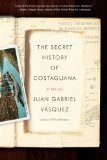Summary | Excerpt | Reviews | Beyond the Book | Readalikes | Genres & Themes | Author Bio

Critics' Opinion:
Readers' Opinion:
First Published:
Jun 2011, 304 pages
Paperback:
Aug 2012, 320 pages
 Book Reviewed by:
Book Reviewed by:
Sarah Sacha Dollacker
Buy This Book
He had enrolled in the Faculty of Law, in obedience to my grandfather's wishes, but after a while devoted only the first part of his days to the legal codes. Like a Don Juan divided between two lovers, my father went from the ordeal of waking at five in the morning to listen to lectures on codified crimes and methods of acquiring dominion to the hidden or secret or parallel life he began after lunch. My father had purchased, for the exorbitant price of half a real, a hat with a doctor's rosette, so as not to be detected by the university police, and each day, until five in the afternoon, he hid out in the Faculty of Medicine and spent hours watching young men like himself, young men of his age and no more intelligent, carry out bold explorations into unknown regions of the human body. My father wanted to see how his friend Ricardo Rueda was able to deliver single-handedly the twins clandestinely born to an Andalusian gypsy, as well as to operate on the appendix of the nephew of Don José Ignacio de Márquez, professor of Roman law. And while this went on, a few blocks from the university other procedures were being carried out that were not surgical but whose consequences were no less serious, for in the velvet-covered armchairs of a ministry sat two men with a quill pen signing the Mallarino-Bidlack Treaty. In accordance with article XXXV, the country that was now called New Granada granted to the United States the exclusive right of transit across the Isthmus of the province of Panama, and the United States undertook, among other things, to maintain strict neutrality in questions of internal politics. And here begins the disorder, here begins...
But no.
Not yet.
I'll reveal more on the subject in a few pages.
The Last Renaissance Man earned a law degree, he did, but I hasten to say that he never practiced: he was too busy with the absorbing vocation of Enlightenment and Progress. By the age of thirty he had not been linked to a single young lady, but his file as founder of Benthamist/revolutionary/socialist/Girondist newspapers expanded scandalously. There was no bishop he had not insulted; there was no respectable family who had not
forbidden his entrance into their home or his courting of their daughters. (At La Merced College, a recently founded school for the most distinguished señoritas, his name was anathema.) Little by little my father specialized in the delicate art of earning disfavor and doors slammed in his face, and Santa Fe society joined willingly in the great slamming. My father did not worry: at that time the country he lived in had become unrecognizable - its borders had changed or were threatening to change, it had a different name, its political constitution was as mobile as a donna - and the government for which my grand father had died had turned, for this reader of Lamartine and Saint-Simon, into the most reactionary of afflictions.
Enter Miguel Altamirano, activist, idealist, optimist; Miguel Altamirano, more than liberal, radical, anticlerical. During the elections of 1849, my father was one of those who purchased the material for the banners that hung all over Bogotá with the slogan Viva López, Terror of the Conservatives; he was one of those who gathered outside Congress to intimidate (successfully) the men who were going to elect a new president; once López, candidate of the young revolutionaries, was elected, he was one of those who demanded from the columns of the newspaper of the moment - I don't remember which one it was at the time, whether The Martyr or The Struggle - the expulsion of the Jesuits. Reaction of the reactionary society: eighty little girls dressed in white with flowers in their hands assembled in front of the Palace to oppose the measure; in his newspaper, my father called them "Instruments of Obscurantism." Two hundred ladies of unquestionable lineage repeated the demonstration, and my father distributed a pamphlet entitled Hell Hath No Fury Like a Jesuit Scorned. The priests of that New Granada, deprived of authority and privileges, hardened their positions as the months went by, and the sensation of harassment increased. My father, in response, joined the Estrella del Tequendama Masonic lodge: the secret meetings gave him a sense of conspiring (ergo of being alive), and the fact that the elders exempted him from the initiation trials made him think that Freemasonry was a sort of natural habitat. Through his efforts the temple managed to catechize two young priests; his patrons recognized these achievements with advanced promotions. And at some point in that brief process, my father, young soldier in search of battles, found one that appeared minor at first glance, almost trivial, but which would, albeit indirectly, change his life.
Reprinted from The Secret History of Costaguana by Juan Gabriel Vásquez by arrangement with Riverhead Books, a member of Penguin Group (USA), Inc., Copyright © 2011 by Juan Gabriel Vásquez.





The House on Biscayne Bay
by Chanel Cleeton
As death stalks a gothic mansion in Miami, the lives of two women intertwine as the past and present collide.

The Flower Sisters
by Michelle Collins Anderson
From the new Fannie Flagg of the Ozarks, a richly-woven story of family, forgiveness, and reinvention.

The Funeral Cryer by Wenyan Lu
Debut novelist Wenyan Lu brings us this witty yet profound story about one woman's midlife reawakening in contemporary rural China.
Your guide toexceptional books
BookBrowse seeks out and recommends the best in contemporary fiction and nonfiction—books that not only engage and entertain but also deepen our understanding of ourselves and the world around us.